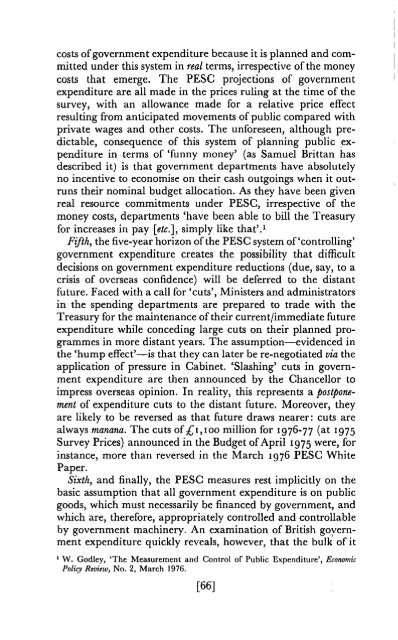THE CONSEQUENCES OF MR KEYNES.pdf - Institute of Economic ...
THE CONSEQUENCES OF MR KEYNES.pdf - Institute of Economic ...
THE CONSEQUENCES OF MR KEYNES.pdf - Institute of Economic ...
Create successful ePaper yourself
Turn your PDF publications into a flip-book with our unique Google optimized e-Paper software.
costs <strong>of</strong> government expenditure because it is planned and committed<br />
under this system in real terms, irrespective <strong>of</strong> the money<br />
costs that emerge. The PESC projections <strong>of</strong> government<br />
expenditure are all made in the prices ruling at the time <strong>of</strong> the<br />
survey, with an allowance made for a relative price effect<br />
resulting from anticipated movements <strong>of</strong> public compared with<br />
private wages and other costs. The unforeseen, although predictable,<br />
consequence <strong>of</strong> this system <strong>of</strong> planning public expenditure<br />
in terms <strong>of</strong> 'funny money' (as Samuel Brittan has<br />
described it) is that government departments have absolutely<br />
no incentive to economise on their cash outgoings when it outruns<br />
their nominal budget allocation. As they have been given<br />
real resource commitments under PESC, irrespective <strong>of</strong> the<br />
money costs, departments 'have been able to bill the Treasury<br />
for increases in pay [etc.], simply like that'. 1<br />
Fifth, the five-year horizon <strong>of</strong>the PESC system <strong>of</strong>'controlling'<br />
government expenditure creates the possibility that difficult<br />
decisions on government expenditure reductions (due, say, to a<br />
crisis <strong>of</strong> overseas confidence) will be deferred to the distant<br />
future. Faced with a call for 'cuts', Ministers and administrators<br />
in the spending departments are prepared to trade with the<br />
Treasury for the maintenance <strong>of</strong> their current/immediate future<br />
expenditure while conceding large cuts on their planned programmes<br />
in more distant years. The assumption—evidenced in<br />
the 'hump effect'—is that they can later be re-negotiated via the<br />
application <strong>of</strong> pressure in Cabinet. 'Slashing' cuts in government<br />
expenditure are then announced by the Chancellor to<br />
impress overseas opinion. In reality, this represents a postponement<br />
<strong>of</strong> expenditure cuts to the distant future. Moreover, they<br />
are likely to be reversed as that future draws nearer: cuts are<br />
always manana. The cuts <strong>of</strong> £1,100 million for 1976-77 (at 1975<br />
Survey Prices) announced in the Budget <strong>of</strong> April 1975 were, for<br />
instance, more than reversed in the March 1976 PESC White<br />
Paper.<br />
Sixth, and finally, the PESC measures rest implicitly on the<br />
basic assumption that all government expenditure is on public<br />
goods, which must necessarily be financed by government, and<br />
which are, therefore, appropriately controlled and controllable<br />
by government machinery. An examination <strong>of</strong> British government<br />
expenditure quickly reveals, however, that the bulk <strong>of</strong> it<br />
1 W. Godley, 'The Measurement and Control <strong>of</strong> Public Expenditure', <strong>Economic</strong><br />
Policy Review, No. 2, March 1976.<br />
[66]












